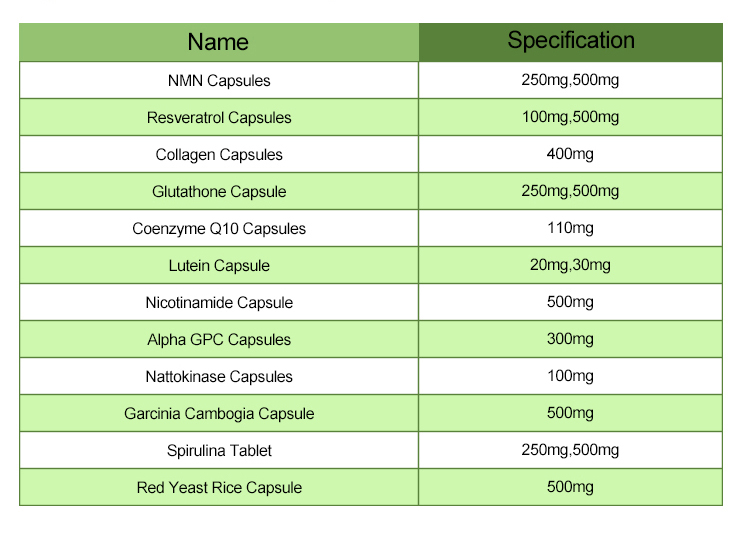Lutein capsules are dietary supplements that contain lutein extracted from natural sources or synthesized in laboratories. Lutein is a type of carotenoid, a natural pigment found in various fruits and vegetables, especially leafy greens like spinach and kale. It is also found in high concentrations in the macula of the eye, where it plays a role in protecting the retina from oxidative stress caused by harmful blue light and free radicals. Lutein is commonly consumed as a supplement, often in the form of lutein capsules, for its potential eye health benefits.
Here are some key points regarding the efficacy and effects of lutein capsules:
Eye Health: Lutein is believed to contribute to eye health primarily by filtering out harmful high-energy blue light and by acting as an antioxidant in the eye. This may help reduce the risk of age-related macular degeneration (AMD) and cataracts, two common eye conditions that can lead to vision loss.
AMD Prevention: Several studies have suggested that regular intake of lutein supplements may reduce the risk of developing AMD, particularly in individuals at high risk or those with early signs of the disease. However, more research is needed to confirm these findings and determine the optimal dosage for AMD prevention.
Visual Function: Lutein supplementation may also improve visual function, including contrast sensitivity and glare tolerance, particularly in individuals with AMD or other retinal disorders. These improvements in visual function can potentially enhance overall quality of life for affected individuals.
Skin Health: Some studies suggest that lutein may have benefits for skin health as well. It is thought to protect the skin from UV damage and oxidative stress, potentially reducing the risk of skin aging and improving skin hydration and elasticity.
Cognitive Health: There is emerging evidence suggesting that lutein may also have benefits for cognitive function and brain health, particularly in older adults. Lutein is found in significant quantities in the brain, where it may help protect against oxidative damage and inflammation.
Dosage and Safety: The optimal dosage of lutein supplements for eye health is not yet well-established. However, typical doses range from 10 to 20 mg per day. Lutein is generally considered safe for most people when taken at recommended doses, but high doses may cause side effects such as yellowing of the skin (carotenodermia) in some individuals.

Nutrient Absorption: Lutein is a fat-soluble nutrient, meaning it is best absorbed when taken with a meal that contains some fat. Some lutein supplements also contain other carotenoids like zeaxanthin, which may work synergistically with lutein to provide additional eye health benefits.
Overall, while lutein capsules show promise for promoting eye health and potentially offering other health benefits, more research is needed to fully understand their effects and determine the optimal dosage and usage guidelines. Individuals interested in taking lutein supplements should consult with a healthcare professional, especially if they have any pre-existing medical conditions or are taking medications.
Adverse effects of Lutein Capsule
Lutein is a naturally occurring carotenoid found in various fruits and vegetables, particularly in leafy greens like spinach and kale. It’s known for its potential benefits for eye health, particularly in reducing the risk of age-related macular degeneration (AMD) and cataracts. Lutein supplements are often taken to boost intake, especially by individuals who may not consume enough lutein-rich foods. While generally considered safe when taken in recommended doses, there can be adverse effects associated with lutein supplementation, particularly in high doses or for certain individuals. Some potential adverse effects of lutein supplementation include:
Skin discoloration: High doses of lutein supplements may cause yellowing of the skin, a condition known as carotenemia. This occurs when there’s an excess buildup of carotenoids in the body, leading to a yellow or orange tint to the skin, particularly noticeable on the palms and soles.
Digestive issues: Some individuals may experience mild gastrointestinal discomfort such as nausea, diarrhea, or stomach cramps when taking lutein supplements, especially if they have sensitive stomachs or are taking high doses.
Allergic reactions: While rare, some people may be allergic to lutein supplements. Symptoms of an allergic reaction may include rash, itching, swelling, dizziness, or difficulty breathing. Anyone experiencing these symptoms after taking lutein supplements should seek medical attention immediately.
Interactions with medications: Lutein supplements may interact with certain medications, such as blood thinners (anticoagulants) like warfarin or antiplatelet drugs like aspirin, potentially increasing the risk of bleeding. It’s essential to consult with a healthcare professional before taking lutein supplements, especially if you’re taking any medications or have underlying health conditions.

Unknown long-term effects: While lutein is generally considered safe for most people, the long-term effects of high-dose supplementation are not well understood. More research is needed to determine the potential risks associated with extended use of lutein supplements.
Risk for smokers: There’s some concern that high doses of lutein supplements may increase the risk of lung cancer in smokers. However, research on this topic is still ongoing, and more evidence is needed to draw definitive conclusions.
It’s crucial to note that the adverse effects of lutein supplementation are generally rare and typically occur with high doses or in individuals with specific sensitivities or medical conditions. As with any supplement, it’s essential to follow the recommended dosage guidelines and consult with a healthcare professional before starting lutein supplementation, especially if you have any underlying health concerns or are taking medications.
